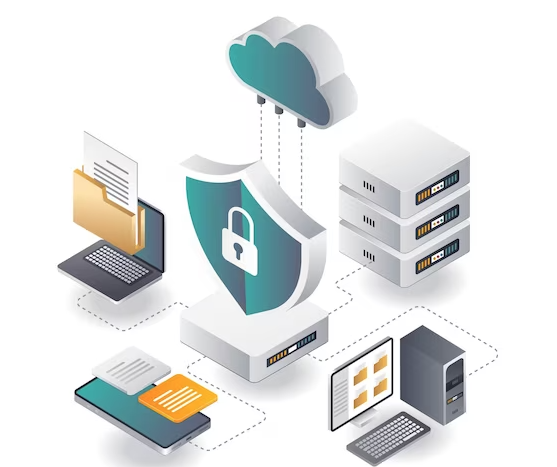

Cyber Risk Assessment
Our team of cybersecurity experts conducts thorough assessments to identify potential risks and vulnerabilities within your organization’s digital infrastructure. We analyze your network, systems, and processes to pinpoint areas of weakness and develop strategies to mitigate risks effectively.
Security Awareness Training
Educating your employees about cybersecurity best practices is crucial in preventing cyber attacks and data breaches. We provide customized security awareness training programs to equip your staff with the knowledge and skills they need to recognize and respond to potential threats proactively.


Endpoint Protection
Endpoint devices such as computers, laptops, smartphones, and tablets are prime targets for cyber attacks. Our endpoint protection solutions include antivirus software, firewalls, and encryption tools to secure your devices and prevent unauthorized access to your sensitive data.
Network Security
Protecting your network from external threats is essential in maintaining the integrity and confidentiality of your data. We implement robust network security measures such as intrusion detection systems (IDS), intrusion prevention systems (IPS), and virtual private networks (VPNs) to safeguard your network from malicious actors


Incident Response Planning
Despite your best efforts, cyber incidents can still occur. Having a well-defined incident response plan in place is crucial in minimizing the impact of a security breach and restoring normal operations quickly. We help you develop and implement comprehensive incident response plans tailored to your organization’s specific needs.
Security Compliance
Compliance with industry regulations and standards such as GDPR, HIPAA, and PCI DSS is essential for protecting your customers’ data and avoiding costly fines and penalties. We ensure that your organization remains compliant with relevant regulations by implementing security controls and conducting regular audits and assessments.

Frequently Asked Questions (FAQ) - Cybersecurity
Cybersecurity refers to the practice of protecting computer systems, networks, and data from unauthorized access, cyber attacks, and data breaches. It is essential for businesses to safeguard their sensitive information, financial assets, and intellectual property from cyber threats to maintain trust with customers, comply with regulations, and avoid financial losses.
Common cyber threats include malware (such as viruses, ransomware, and spyware), phishing attacks, data breaches, DDoS (Distributed Denial of Service) attacks, insider threats, and social engineering tactics. These threats can lead to data loss, financial fraud, reputational damage, and legal consequences for businesses.
Businesses can assess their cybersecurity risks through a comprehensive cyber risk assessment process. This involves identifying potential threats and vulnerabilities in their digital infrastructure, evaluating the likelihood and potential impact of these risks, and developing strategies to mitigate and manage them effectively.
Businesses can improve their cybersecurity posture by implementing a layered approach to security, including measures such as regular software updates and patches, strong password policies, encryption of sensitive data, employee training and awareness programs, network segmentation, and access controls. Additionally, businesses should develop and implement an incident response plan to respond quickly and effectively to security incidents.
Employee training is critical in cybersecurity efforts as employees are often the first line of defense against cyber threats. Businesses should provide comprehensive cybersecurity awareness training to educate employees about common threats, phishing scams, social engineering tactics, and best practices for secure behavior online. This training helps empower employees to recognize and report potential security incidents, reducing the risk of successful cyber attacks.
Businesses must stay informed about relevant cybersecurity regulations and standards applicable to their industry, such as GDPR, HIPAA, PCI DSS, and NIST Cybersecurity Framework. They should implement security controls and practices to comply with these regulations, conduct regular audits and assessments to ensure compliance, and maintain documentation of their cybersecurity policies and procedures.
Outsourcing cybersecurity services to a trusted third-party provider can offer several benefits for businesses, including access to specialized expertise and resources, cost-effectiveness, scalability, and round-the-clock monitoring and support. Outsourcing allows businesses to focus on their core operations while ensuring that their cybersecurity needs are met by experienced professionals.
In the event of a cybersecurity incident, businesses should follow their incident response plan to contain the threat, mitigate the impact, and recover their systems and data. This may involve isolating affected systems, restoring data from backups, conducting forensic analysis to identify the root cause of the incident, and communicating transparently with stakeholders about the situation.
When selecting a cybersecurity service provider, businesses should consider factors such as the provider’s experience and expertise, range of services offered, industry certifications and accreditations, reputation and track record, compliance with regulatory requirements, and quality of customer support and responsiveness.
Businesses should adopt a proactive approach to managing cybersecurity risks by regularly assessing their security posture, staying informed about emerging threats and vulnerabilities, updating security policies and procedures, conducting regular security awareness training for employees, and implementing robust security controls and technologies to detect and prevent cyber attacks.
Still have questions?
I you can’t find answers to your questions in our FAQ section, you can always Contact us. We will get back to you shortly.